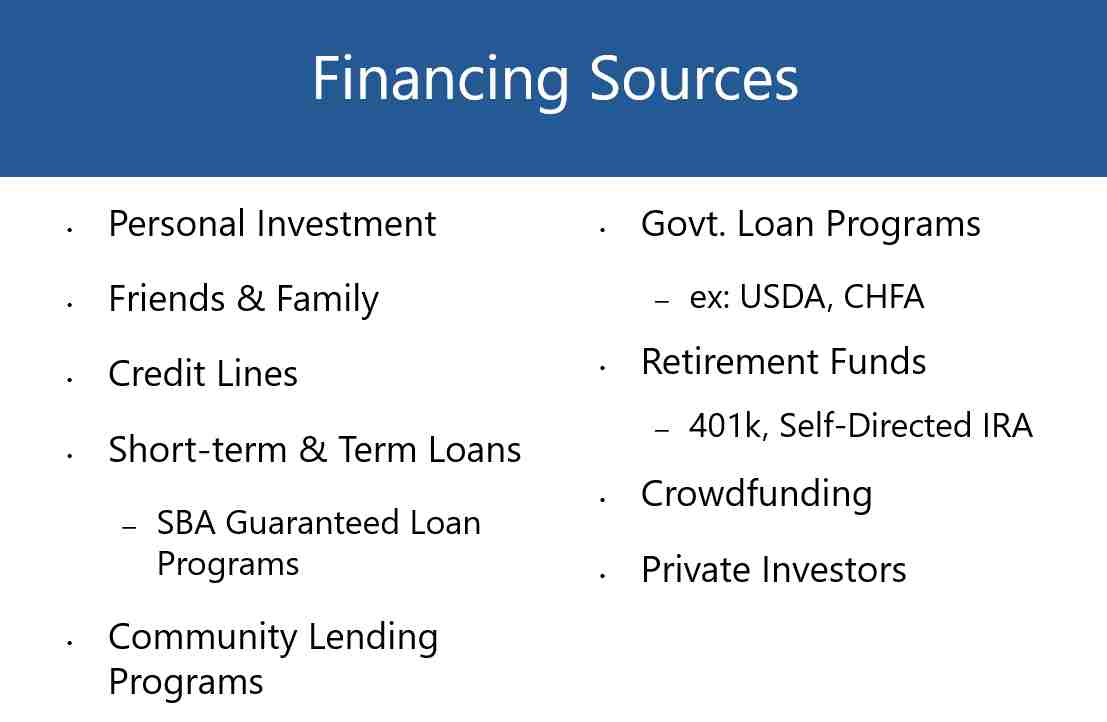Enjoy the following excerpt from my FREE What You Need to Know About Starting a Business course where I talk about some important but often unknown facts about the SBA, using retirement funds, and private investors as sources of funding.
Video Transcript [lightly edited for clarity]

Here are the most common sources of funding. Personal investment is number one. Friends and family, credit lines, short term loans,,, you can see all these different things.
The SBA
I’d like to add to this particular slide the SBA is not a direct lender. The SBA does not give you a loan. The SBA guarantees the lender that your loan will be good. This is the way I like to explain it. How many people here own a home? How many people put down more than 20% when they purchased their home? The people who didn’t raise their hands in that second round had to buy what? Private mortgage insurance. That is an assurance to the bank–you pay additional money for that to the bank–that says if you’d stop making payments and [the bank forecloses and now] owns your house and they sell it at auction and they don’t [get enough in the sale to] pay off the debt, that insurance pays the spread so the bank is whole.
Remember the banks have zero risk tolerance, so they require that insurance policy. The SBA is that private mortgage insurance [except] for business loans. The SBA works with the bank to guarantee it.
When you get that loan for 7% and you don’t qualify on your own you need to bring the SBA in. That 7% plus the SBA insurance policy gets added to that. So, it cost you a little bit more to get an SBA guarantee but it might be the only way you’re going to get that loan.
Retirement Funds
There are various [specific agency] loan programs, [but I want to focus on is] retirement funds. We talked a little bit about the fact that you can borrow half of the funds in your 401k and pay the [principle and] interest back to yourself. There is no bank involved at all, you just need somebody to administer that.
If you own retirement funds in an IRA, depending on certain types of situations you can create a c-corporation and so long as you’re not the principal owner in that particular business, maybe you just want to be an investor in that business, you can now create what we call a self-directed IRA and then use that money [in the IRA] and invest in a business that’s not publicly traded. It’s your particular business and when that money [such as dividends are] paid back to the fund, that ultimately comes back to you. So, there are ways to do this but it gets a little bit more cumbersome.
Private Investment
The last one we’ll look at is private investors. For the angel levels and for venture money I will say this: Unless you have a blockbuster product it probably will never be looked at by an angel or a venture capital company.
Angel Investor
I want to make clear the difference between an angel investor who is generally a high-net-worth individual who believes in your particular product or service and is willing to give you money but more than that they’re what I call smart money. If you ever watched Shark Tank when they [the sharks] invest in a particular business they’re not only giving that company the cash that they require but they’re bringing in their contacts and their connections with the hope to double down on [the investment]. That’s what an angel investor is. The angel has hookups for you in addition to the cash because they’re looking at doing a multiplier. They’re not looking at just loaning you money. They’re looking to see if they can loan you money and can double or triple [the return] because they can bring in a particular party that’s going to really make the company sail. It is a scaling function and that’s what angel investors do.
Venture money
Venture money is a lot different. Venture money is from a fund manager. They’re beholden to who? The investors that have put the money in their fund. They don’t care about you as an individual. They may be investing in your business to own a majority share so that they can steer your company in a certain direction perhaps you don’t even want to go. Because at the end of the day it’s going to benefit the portfolio as a whole. “So, I just bought your business but now I want you to sell your product to my partner over here for a dollar”. You say. “I can’t make money on that.” To that, they say: “I don’t really care because I own you now” So your business goes out but the other business soars like crazy. You don’t know it’s a crapshoot. Not a lot of venture money here, perhaps some angel money, but most of the time you’re probably never going to see that. It’s going to come from one of these sources here except for the private investors.
Let us know in the comments below what other important but often unknown facts you have discovered when your looked at the difference sources of funding.












